'I blew shit up' - now I run ultra marathons
How 20 years in the US Navy has helped Natasha Swartley find the resilience to run long distances
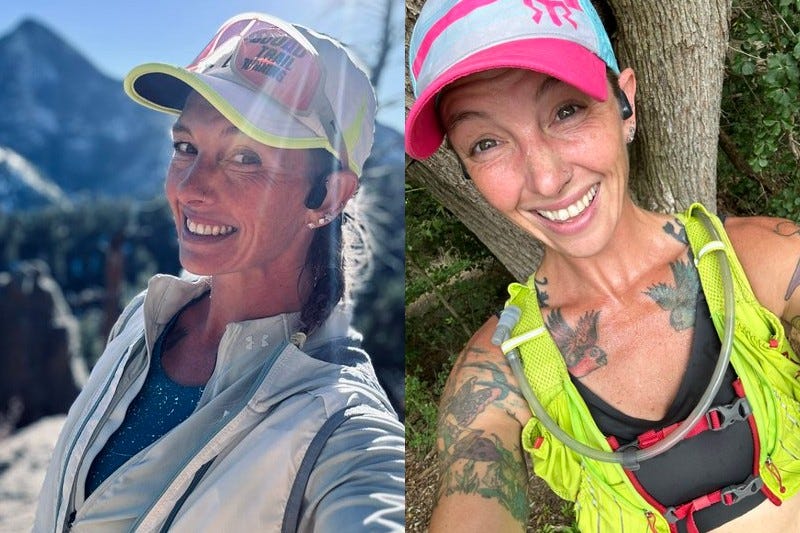
In the modern jobs marketplace, transferable skills are increasingly important.
And, it turns out, they can be equally useful when being battered by the wind and rain half-way round an ultra marathon.
At least, that’s been the case for Natasha Swartley.
Tasha spent 20 years in the US Navy before retiring. Her experiences pushing bombs back and forth on a flight deck in all weather, thriving in a male-dominated world and training thousands of sailors have helped prepare her for both life on civvy street and the often brutal experience of trail running huge distances.
She wasn’t always into running though.
Tasha told Running Tales she had been “lazy” in high school and didn’t play sports growing up.
Thanks for reading and listening to Running Tales. We couldn’t do this without your support - please back us to keep going by…
Even when she joined the Navy, at the age of just 18, she “hated working out”.
“I did do a lot of push ups because I'm a little sarcastic at times,” she said.
“So I was rewarded with push ups quite frequently.
“But as my career progressed, I got more into running. I think I actually started road running back in 2008. I was gaining a little bit of weight and my uniforms were getting a little snug, so I tried it.
“I got into trails a few years later, in 2015, when I moved out to San Diego. And that's really when my fitness started to progress.”
Such was the extent of that move into the running world that Tasha ended up becoming a command fitness leader in charge of 3,000 sailors.
Responsible for making sure they passed fitness tests, she admits to having pushed them hard despite her own previous aversion to exercise.
“I really had to set the bar a lot higher for myself, because if I'm going to expect people to do their job, then I need to be able to do it,” she said.
“I was so not nice about it. I had the knife hand of knife hands and I was like, that's not a push up.
“They hated me. But man, it was respected because I had high standards.”
Having entered the Navy at such a young age, as a woman in what was very much a man’s world, Tasha had to adapt quickly and prove she was not only good enough but often better than her male colleagues.
“It was huge,” she said. “I was 18 when I went in and I retired when I was 38, so I did 20 straight years of service.
“I work as a wilderness EMT (emergency medical technician) now, but I didn’t do that when I was in the Navy.
“I blew shit up. I worked on weapons for a long period of time. It's a very male dominated type of job - a lot of heavy lifting, it's gruelling, very tiresome, can be very cumbersome mechanic work.
“It’s greasy, it's gross, but it's whatever needs to get done. When I joined in 2001, I had no idea what I was getting into.
“I had never seen weapons and didn’t know anything about aviation weaponry. Little did I know that I was going to be putting bombs on fighter jets for a good amount of my career.
“I was going to be lifting them and assembling them and storing them, and handling them, and being in charge of them, and moving them, and loading them, and arming them, and all this stuff.”
Tasha said she was lucky to work with a handful of senior women during her early days in service, but she still represented what was a growing community within the force.
“Our Navy is 248 years old,” she said, “but there are still steps that women, not just in my job, but in the service overall, are catching up on in the weapons field.
“We still have to make certain rankings. Even when I was deployed in 2018, I was the most senior female in my job field out of 6,000 people.
“I felt like a lot of weight on my shoulders to adhere to certain standards because a lot of people had their eyes on me.”
Tasha said things are slowly progressing though, pointing to the elevation BJ Farrell to the command of an aircraft career - the first woman to take on such a role in US naval history.
“Having been through what I've been through and seeing the progression of women in the service is fantastic,” Tasha said.
“During my time in the service, women were allowed to go on submarines and they opened the doors for women to get into more special operations programs.
“And now we have women as skippers on these ships and the big vessels. It’s amazing.
“I got to meet BJ. I’m not going to lie, I cried. It was just such an empowering moment.”
Tasha was still deployed with the Navy when she prepared for her first ultra, meaning most of her training took place on a stationary treadmill.
Add in “knowing nothing about electrolytes, nutrition, how to eat all these things, or even how to train going into this type of terrain” and she had her work cut out when she rocked up at the start line of a 50-miler in Oregon.
Initially, a “it’s just a run” attitude got her through the first half of the event, but after that “my life went to shit”.
“First of all, I thought I was developing hypernatremia, which is over-hydration or dehydration,” she said.
“My urine colour was dark and I thought I was going to die. I was instantly panicking.”
It was panic which proved unfounded.
“Make a note - don’t eat beets the night before a big race,” she laughed.
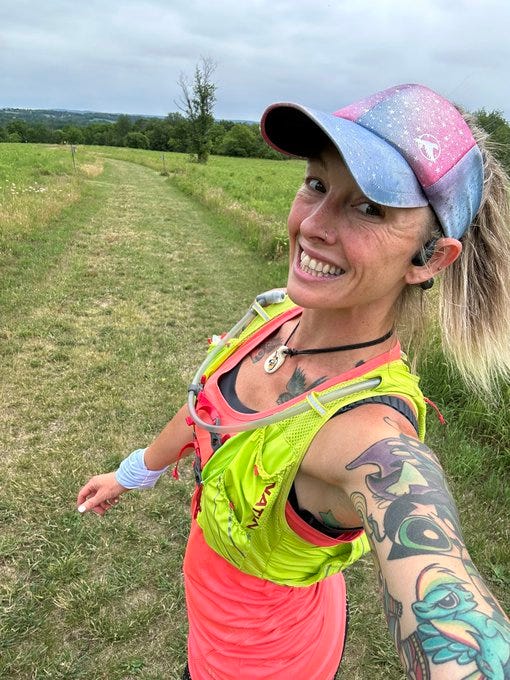

But urine colour concerns weren’t Tasha’s only problem, with proper nutrition - or the lack of it - starting to slow her down.
“I was just eating things that were at the aid stations, hanging out,” she said. “Like every first timer I was thinking, wow, there's food.
“So, I got to it mile 37 and was hardcore bonking. I was angry and frustrated.
“And I don't ever really get angry. So my friend I was running with was looking at me and she was, like, you need to eat.
“She’s five two, I'm five eight, so she was looking up at me with this sandwich in her hand. And she was, like, you need to fucking eat.
“And I was, like, fuck you. I took the sandwich and chucked it in the bin.
“It was like, no, I'm done with this shit. And I just moseyed out of the aid station, super angry, munching on chips.
“And I finished with a minute to spare. I definitely felt everything. I'll never forget that.
“It was so miserable, that first ultra. I remember the drive home the next day.
“I was a passenger and I was so exhausted, I couldn't get my own shoes on. I couldn't walk, I couldn't eat. I was so nauseous.
“It took me two days just to get out of bed. I'd crawl to the bathroom, I was just a wreck.”
Also on Running Tales:
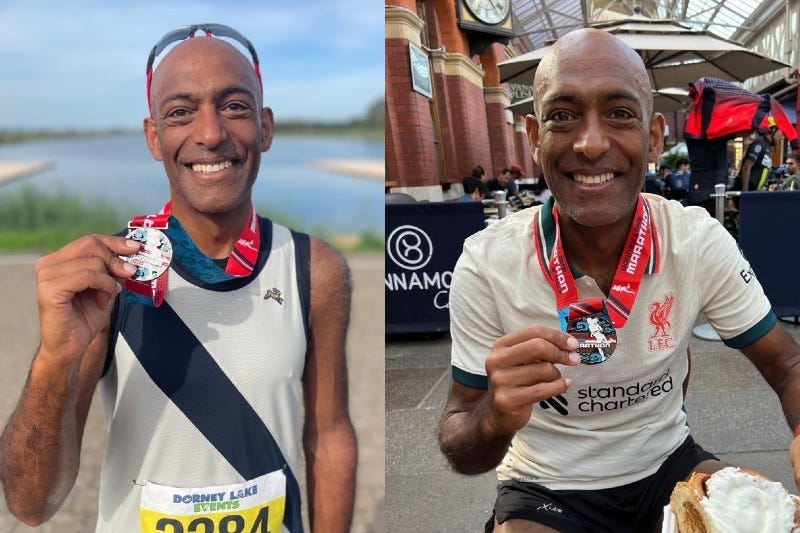
How 'Ro Farah' mastered bipolar disorder to embrace London Olympic legacy
From marathons to best selling books - how running changed Hannah Phillips' life
These days Tasha often finds herself on the other side of such conversations, desperately trying to force feed angry ultra runners as she helps volunteer at aid stations.
“They’ve told me they've puked six times and I’m trying to shove food in their face,” she said.
“It's enlightening, because when you see them, when they come through that finish, or when they reach that aid station, and they're saying they can't do it anymore and you're trying to find any reason to make them sit down before they finalise any decision.
“And every single one of them deserves so much kudos. Every bit of it is so rewarding.”
One item that helped Tasha get through that first ultra was a patch of material embossed with the letters DFQ.
“It stands for don't fucking quit,” she laughed. “I still have that patch to this day.
“It’s part of a harder, more aggressive side of me that I find when I hit that low.
“I've really matured in my ultra training where I'm not as aggressive about it anymore. I'm very more mindful and practice more mindfulness when I'm out on the trails, but when I'm hitting that bonk, that low… DFQ.
“I’m trying to really dig even deeper into my soul and don't fucking quit.”


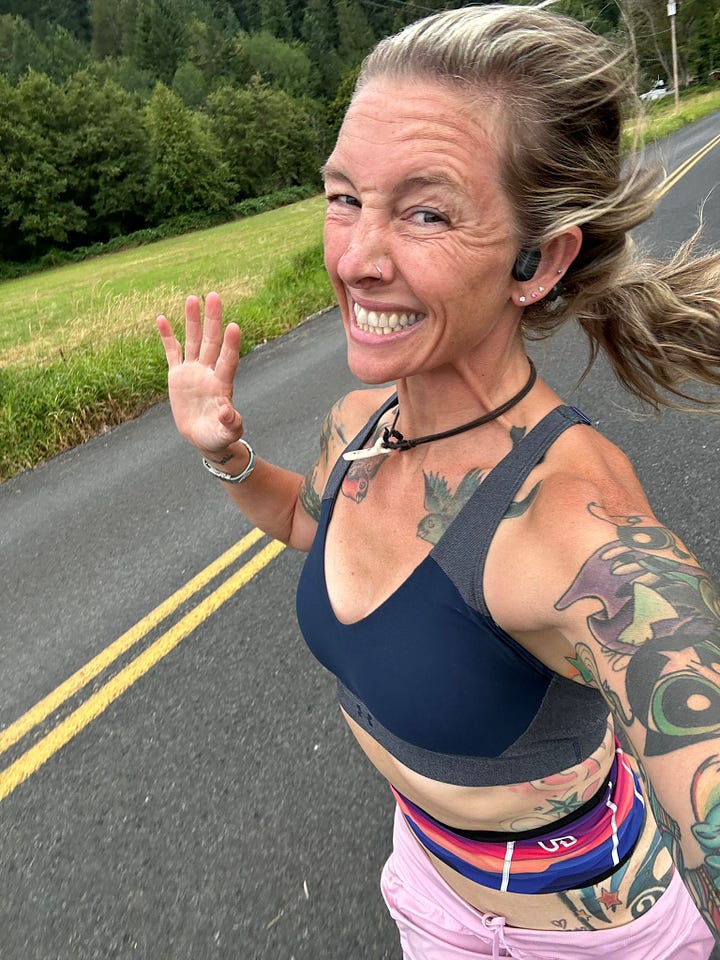
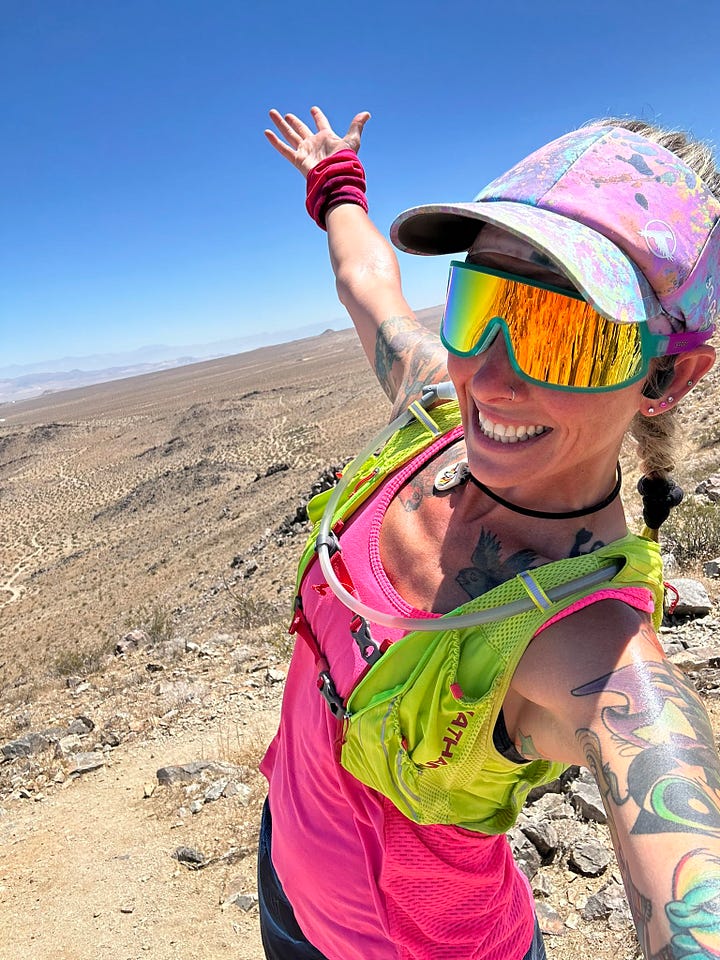
Despite her never-say-die attitude, Tasha is realistic about the challenges ultra running can bring and how it is sometimes better to live to fight another day.
She told Running Tales she sees being unable to finish races - Tasha has two DNF’s at the 100-mile distance, with her longest run to date registering 71 miles - as important lessons.
“Sometimes you have to stop, it's not in the stars,” she said.
“I don't even want to call it DNFs because I've got two. And that's fine. They're lessons, and I made choices to pull out for all the right reasons.
“So, did I quit? Essentially, yeah. But that’s fine.
“What’s beautiful is the trail community is very supportive about it because nearly everyone in some capacity has been humbled by nature.”
Not that all her races have ended in pain - far from it. Earlier this year, Tasha placed fifth overall and first female at the Great Hill Ultra 100k in New York.
She told Running Tales the skills and resilience she learnt in the Navy are traits that have gone a long way in her life in general - and on the trails.
“When you're in, it's tough, but when you come out, and I've experienced it, it makes you better.
“It really makes you better, because nobody's going to tell you, like, oh, you missed your doctor's appointment. That's not going to happen.
“I loved what I did. I was proud to serve and I didn't want to mess up. There was a lot of people who were relying on us to keep them safe at home.
“It’s funny because there are some days, like the last race I did where I was running through 24 hours of rain, when I think, ‘I've done this before’.
“I've pushed bombs back and forth on a flight deck, which is four acres space in total, with waves crashing around me. I've put bombs on jets in pouring rain while wearing heavy leather boots. I've done it in snow, I've done it in freezing temperatures.
“These thoughts do run through my mind. Does it mean that I want to do it? No. Does it mean that I can? Yes.
“And that's the difference. When I'm in a race setting, I'm not competitive. I'm a mid-pack runner, and that's fine by me. But it still gets me through.
“When some folks are hitting their lows, which is a real thing, you’ve got to find that peace. That why.”
Tasha said ultimately everyone can embrace the experiences they have been through to help them take on new challenges in life and running.
“At the end of the day, as people, we have gone through so much in our own individual lives,” she said
“Those low moments when they hit, they can hit very hard.
“But remember those times that you've gone through, those points where you didn't think you could make it, and when you're sitting there and you're having those self doubts, remember you can do it.
“It's just sometimes that want to not do it is superseding. So, think about what you can do versus what you want to do, and flip that.”
Thanks as ever for reading and listening to Running Tales. We couldn’t do this without your support - please back us to keep going by…






